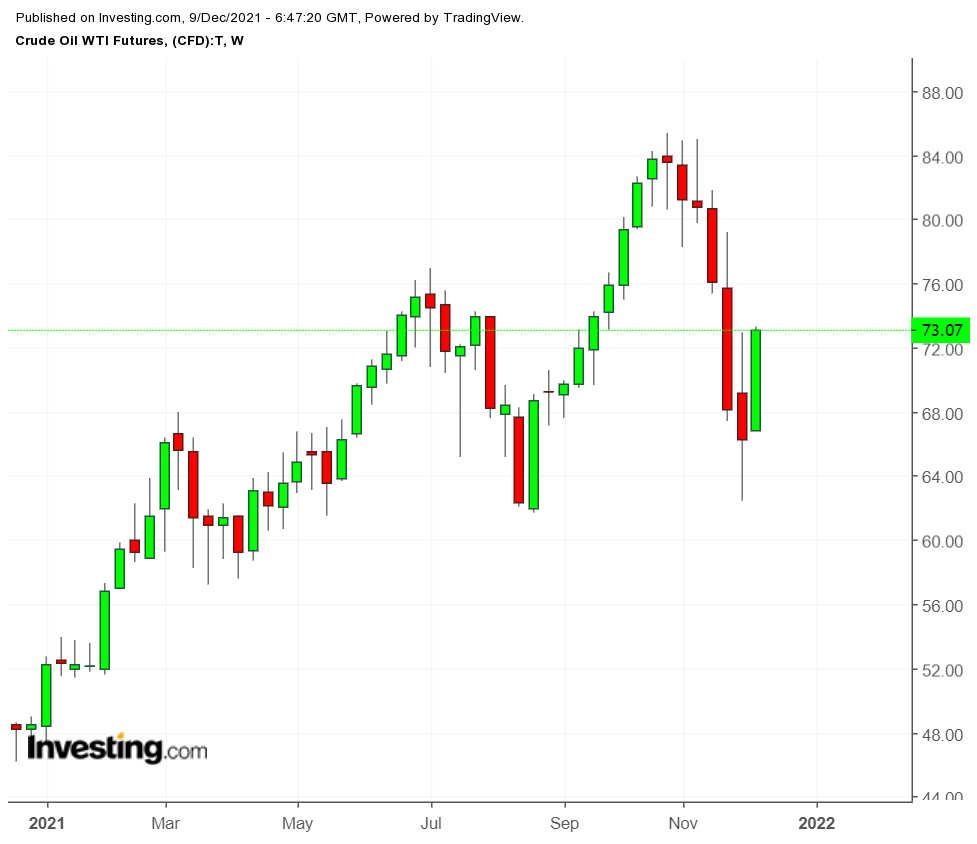Market changing events are unpredictable, even in the short term. No one predicted that news about the Omicron variant would cause oil prices to drop on Black Friday.

As such, there's no telling where the next market-moving event will come from. However, all the elements at the moment seem to be in place for oil prices to remain fairly stable between now and the end of 2021.
Here's a look at why prices seem likely to remain within the $70 range—as well as what unforeseen factors could cause a major drop or jump before year end.
Why prices could remain relatively stable in the $70 per barrel range
The market is now showing a lack of concern regarding the potential economic impacts of Omicron. This is likely because information is emerging that supports the hypothesis that the Omicron variant is less severe. In addition, most countries do not appear to be instituting significantly more stringent restrictions on travel or movement, which traders initially feared could hurt oil demand. (The U.K. is one exception, and there's more on that below).
On news of the OPEC+ stand to continue with its planned 400,000 bpd production increase for January, oil prices briefly dropped because the decision seemed to surprise many traders who had expected OPEC+ to pause its production increases.
However, prices recovered quickly, especially after Aramco (SE:2222) issued higher official selling prices (OSPs) to Asia and the United States for January oil deliveries. This is a sign of confidence in the global economy and a lack of concern from oil producers about the impact of the Omicron variant on oil demand.
U.S. oil production continues to show only marginal growth, which helps keep prices from falling as production from OPEC+ grows. Two weeks ago, U.S. output, which had been stable at 11.5 million bpd, grew by only 100,000 bpd, according to the EIA. Last week production grew again by only 100,000 bpd.
These modest increases come despite weeks of higher prices. Measured growth by U.S. producers—as opposed to the type of significant jumps in production that were observed in previous years—is keeping a floor on prices.
Oil demand for the remainder of 2021, and the beginning of 2022, is looking weaker than previously forecast. The EIA now expects that less oil will be drawn from global crude oil inventories in December 2021 than previously predicted. In addition, it recently revised its global demand forecast for Q1 2022 down by 550,000 bpd. Lower demand expectations may help keep oil prices from rising too much before the end of the year.
The holiday season is upon us and trading is often based on fewer exciting events as much of the world transitions into a holiday season. Barring any major news, oil prices could remain comfortably in the $70 range for the rest of the year.
Why prices could drop
Yet, even during the holiday season, the potential remains for news headlines to cause oil prices to drop like they did on Black Friday. For example, European countries could return to lockdown-type policies that restrict movement if COVID once again accelerates.
On Wednesday, U.K. Prime minister Boris Johnson urged people to work from home and sought to reimpose rules about wearing facemasks in indoor venues. This could be a sign of additional, demand-curbing restrictions to come in Europe. If Johnson’s policies are the start of a trend—and especially if domestic and international travel are further curbed—prices could fall even before the new year.
Why prices could rise
Should big banks issue bullish forecasts for 2022 before the end of the year, prices could very well start to rise now. In fact, JP Morgan said last week that its analysts believe oil prices could reach $125 per barrel in 2022. Earlier this week, the investment bank issued its Outlook 2022, which foresees a strong global economy supported by high oil prices. The question is how serious traders will take such forecasts as a hint for how they should act now.
Another possibility, though seemingly remote, is that Russia could invade Ukraine. An Undersecretary of State in the United States just warned that Russia’s military buildup outside of Ukraine is even greater than when it invaded Crimea in 2014.
Russia is currently the third largest oil producer in the world and could potentially face some sort of sanctions on its oil from the United States as a result of military action in Europe. (Russia also provides more than half of the European Union’s natural gas, and there are also several natural gas pipelines in Ukraine). A conflict involving Russia could spike prices as the world considers what it all means.
